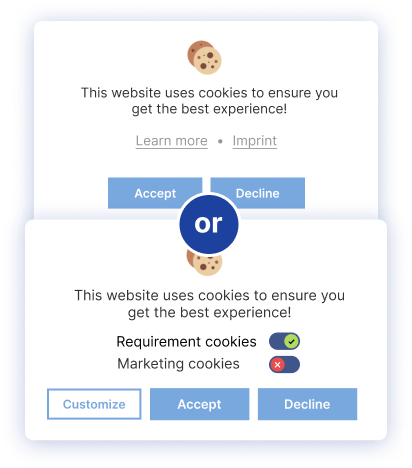Introduction
The protection and privacy of personal data are of critical importance and businesses are required to navigate the complexities of managing customer consent and preferences effectively. To comply with data privacy regulations, companies must implement robust consent management and preference management strategies. Consent management refers to obtaining explicit consent from individuals for collecting and processing their personal data. It involves acquiring permission from users before utilizing their data for any intended purpose. Consent management is crucial in ensuring that the data collected and processed by companies is done with the full awareness and permission of the users involved.
On the other hand, preference management involves understanding and catering to individual preferences regarding data usage and communication channels. This process involves taking into account the specific needs and interests of each customer and identifying the preferred communication channels, such as email, phone, or social media, for the delivery of relevant marketing messages and promotional offers. By implementing a robust preference management system, companies can ensure that their customers remain engaged and satisfied while their data is used in a manner that is consistent with their expectations.
What is a preference management system?
Preference Management Systems refer to platforms or software solutions designed to facilitate the collection, management, and utilization of user preferences. Here’s a concise breakdown:
Definition: Preference management involves allowing consumers to choose how companies communicate with them.
Functionality: These systems simplify the process of collecting and managing user choices, ensuring compliance with regulations.
Differentiation from consent management: While consent management focuses on obtaining consent, preference management deals with managing user preferences once obtained.
Market importance: The market for consent and preference management supports various aspects, including collecting, consolidating, synchronizing, and using end-user choices.
Benefits: Preference management platforms help build transparent relationships with customers by offering personalized customer journeys.
Understanding Consent Management Platforms
Consent management platforms (CMPs) play a crucial role in helping organizations manage user data privacy and comply with the latest data privacy regulations, such as the GDPR and CCPA. These platforms essentially act as a bridge between businesses and their customers, streamlining the consent process and making it more efficient.
CMPs enable businesses to collect and manage user consent in a centralized manner, which helps them keep track of user preferences and avoid any legal or regulatory issues. With a CMP in place, businesses can easily provide users with clear and detailed information on how their data is being used, giving them greater control over their personal information.
Moreover, CMPs offer opt-in and opt-out mechanisms, which allow users to easily manage their consent preferences. This means that customers can choose to opt-in or out of specific data collection activities, and businesses can update their records accordingly.
Overall, CMPs are essential tools for businesses seeking to comply with data privacy regulations while also providing a transparent and user-friendly experience to their customers.

The role of preference management systems
Preference management systems are advanced tools that aim to capture and analyze customer preferences to deliver personalized experiences. These systems are designed to help organizations understand user preferences regarding various aspects of their business, such as product offerings, communication frequency, and channel preferences.
By leveraging this information, companies can create customized offers, targeted messaging, and tailored experiences for their customers. Preference management systems can also help reduce spam and irrelevant content by allowing users to control the frequency and type of communication they receive from businesses. Overall, preference management systems are a crucial component of modern customer engagement strategies that can lead to higher customer satisfaction, loyalty, and retention.
Compliance with data privacy laws
Data privacy is a top concern for both individuals and businesses. With the advent of various data privacy laws and regulations such as the GDPR, CCPA, and other global privacy regulations, it has become mandatory for businesses to implement robust consent and preference management strategies to maintain compliance with these regulations.
Consent management refers to the process of seeking and obtaining explicit consent from individuals for the collection, processing, and sharing of their personal data. Preference management, on the other hand, involves providing individuals with control over their personal data by allowing them to specify their preferences for how their data is collected, processed, and used.
By implementing these two strategies, businesses can ensure that they are collecting and processing personal data in a lawful and transparent manner. This not only reduces the risk of non-compliance but also helps to build trust with customers and other stakeholders. Moreover, compliance with data privacy laws and regulations can help businesses avoid potential penalties and reputational damage that may arise from non-compliance.
Therefore, businesses must prioritize consent and preference management as a key element of their overall data privacy strategy. With the right tools and processes in place, businesses can effectively manage consent and preferences while also maintaining compliance with the latest data privacy regulations.
Strategies for preference management
Preference management strategies are an effective way for businesses to improve customer engagement and loyalty. These strategies involve gathering data on individual customer preferences and using it to personalize product offerings, services, and marketing campaigns. By doing so, businesses can create a more tailored experience for their customers, which can result in increased customer satisfaction and loyalty.
For example, a business might use customer data to offer personalized product recommendations, targeted promotions, or customized content. Overall, preference management strategies are a powerful tool for businesses looking to improve customer experience and build lasting relationships with their customers.

The impact on customer loyalty
The effective management of customer preferences can have a significant impact on building customer loyalty. By delivering personalized experiences that resonate with individuals, brands can make their customers feel understood and valued. This leads to a higher probability of customers remaining loyal to a brand and even advocating for it within their social circles.
With the help of advanced technologies, businesses can gather and analyze customer data to gain insights into their preferences and behavior. This data can then be leveraged to offer highly relevant and personalized experiences to each customer. By doing so, brands can build stronger relationships with their customers, which can lead to increased customer retention and, ultimately, higher revenues.
Leveraging Data Protection Authority guidelines
Data protection authorities play a crucial role in ensuring the privacy and security of individual’s personal information. To help organizations comply with regulatory requirements and industry standards, these authorities provide detailed guidelines and best practices for managing consent and preferences. These recommendations cover a range of topics, including how to obtain valid consent, how to communicate privacy policies effectively, and how to give individuals control over their personal data.
By following these guidelines, organizations can ensure that they are collecting, processing, and storing personal information in a transparent, fair, and lawful manner. This can help build trust with customers, partners, and other stakeholders and ultimately contribute to the organization’s long-term success.
Preference management solutions for retail businesses
Preference management solutions are becoming increasingly important in the retail sector, as they offer an effective way to enhance the customer experience and drive sales. These solutions work by analyzing customer preferences and purchase histories, in order to help retailers offer personalized recommendations and promotions that are tailored to individual interests.
By using this data, retailers can gain a better understanding of their customers’ needs and preferences and can use this information to create targeted marketing campaigns that are more likely to resonate with their audience. This can lead to higher levels of engagement, increased customer loyalty, and ultimately, higher sales and revenue for the business.
Implementing preference management platforms
Preference management platforms are powerful tools that allow businesses to collect, store, and analyze customer preference data in a centralized manner. These platforms enable organizations to gain a comprehensive understanding of their customers, their behavior, and their preferences. By leveraging the insights provided by these platforms, businesses can make data-driven decisions that inform their marketing strategies and overall business operations.
These insights can be used to optimize marketing campaigns, personalize customer experiences, and improve customer retention rates. With preference management platforms, businesses can create more meaningful interactions with customers while also improving their bottom line.

Addressing opt-out requests
Preference management is an essential aspect of data privacy and protection. It involves respecting users’ choices and preferences regarding their personal data. Users must have the right to control their data and be able to withdraw their consent or opt-out of data processing activities at any time.
To ensure compliance with data protection laws and regulations, organizations must provide users with user-friendly mechanisms to manage their preferences and unsubscribe from communications. This includes providing clear and accessible information about how to exercise their rights and preferences.
Organizations must also ensure that users’ requests to withdraw consent or opt-out of data processing activities are promptly and effectively implemented. They should have appropriate systems and processes in place to handle such requests and ensure that users’ data is deleted or anonymized as required.
Renewing consent regularly
It is essential for organizations to maintain compliance and foster consumer trust. One way to achieve this is by periodically renewing consent and updating preferences. This ensures that consumers remain informed and in control of their personal data. Moreover, businesses can demonstrate their commitment to data privacy and regulatory compliance by staying proactive and transparent about data practices. This includes providing clear and concise information about what data is collected, how it is used, and who it is shared with. Additionally, organizations should implement appropriate security measures to protect personal data from unauthorized access, disclosure, or misuse. By doing this, businesses can build trust with their customers and differentiate themselves from competitors who do not prioritize data privacy.
Differentiating between consent and preferences
Consent management and preference management are two important processes that organizations must implement to ensure compliance with data protection regulations and meet the expectations of their users. While consent management focuses on obtaining explicit consent from users regarding the processing of their personal data, preference management centers on understanding and accommodating individual preferences related to how their data is handled.
Consent is a legal requirement that organizations must meet in order to collect and process personal data. However, preferences go beyond legal requirements and reflect the choices and expectations of users regarding how their data is used and managed. By implementing preference management strategies, organizations can build trust with their users and enhance their overall experience with their products or services.
Conclusion
Modern data privacy strategies are incomplete without effective consent and preference management processes. In today’s data-driven world, organizations need to implement robust systems that enable them to collect, store, and use customer data in a way that respects their privacy while also delivering personalized experiences that enhance customer satisfaction and loyalty.
Consent management involves obtaining explicit permission from customers to use their personal information for specific purposes. This can include collecting data, sharing it with third parties, or using it for targeted advertising. Preference management, on the other hand, involves giving customers control over how their data is used. This can include allowing them to opt-out of data sharing or choose which types of marketing communications they receive.
By implementing these processes and leveraging technology solutions, organizations can navigate the complexities of data privacy regulations while delivering personalized experiences that enhance customer satisfaction and loyalty. This can lead to increased customer trust and loyalty, as well as improved brand reputation and customer retention.




